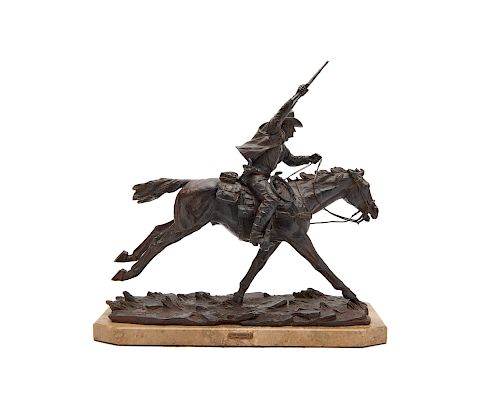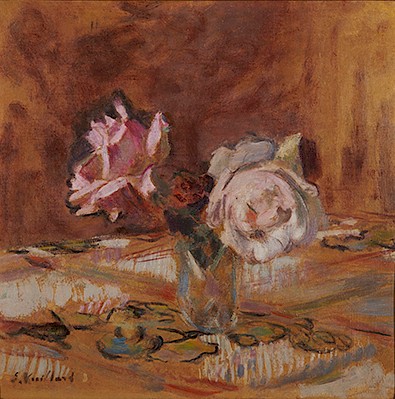HARRY JACKSON, (American, 1924-2011), The Marshall II, 1978, bronze on marble base, height: 17 1/2 in.
Lot 145
Estimate:
$5,000 - $8,000
Absentee vs Live bid
Two ways to bid:
- Leave a max absentee bid and the platform will bid on your behalf up to your maximum bid during the live auction.
- Bid live during the auction and your bids will be submitted real-time to the auctioneer.
Bid Increments
| Price | Bid Increment |
|---|---|
| $0 | $100 |
| $1,000 | $100 |
| $2,000 | $250 |
| $5,000 | $500 |
| $10,000 | $1,000 |
| $20,000 | $2,500 |
| $50,000 | $5,000 |
| $100,000 | $10,000 |
| $200,000 | $25,000 |
| $500,000 | $50,000 |
About Auction
By Grogan & Company
May 5, 2019
Set Reminder
2019-05-05 12:00:00
2019-05-05 12:00:00
America/New_York
Bidsquare
Bidsquare : The Spring Auction
https://www.bidsquare.com/auctions/grogan/the-spring-auction-4045
Exhibition Hours Thursday, May 2: 12 noon - 6 pm Friday, May 3: 12 noon - 6 pm Saturday, May 4: 10 am - 5 pm Advance preview by appointment. Grogan & Company info@groganco.com
Exhibition Hours Thursday, May 2: 12 noon - 6 pm Friday, May 3: 12 noon - 6 pm Saturday, May 4: 10 am - 5 pm Advance preview by appointment. Grogan & Company info@groganco.com
- Lot Description
HARRY JACKSON
(American, 1924-2011)
The Marshall II
1978, bronze on marble base
inscribed and dated Harry Jackson 1978; numbered MAII 21
height: 17 1/2 in.
Provenance: The Collection of a Massachusetts Lady.
Other Notes: Raised in Chicago by a single mother, Harry Jackson ran away from home at the age of 14 and headed West. From an early age, he was inspired by the cowboy culture of the West, returning to the trope throughout his artistic career. He was a sketch artist for the Marines during World War II, and, after being wounded in the Battle of Tarawa, convalesced in Los Angeles, where he was exposed to the works of Abstract Expressionists such as Jackson Pollock for the first time. Jackson was immediately drawn to these works, and moved to New York, studying under Rufino Tamayo and Hans Hoffman while befriending Pollock, de Kooning, and others. He exhibited at Tibor de Nagy in the early 1950s and was lauded by Clement Greenberg and others as one to watch within the second generation of abstract expressionists. However, it was not long before Jackson turned away from abstract expressionism, traveling to Italy in 1954, exploring portraiture and history painting, and ultimately leaving the New York scene behind. He developed an interest in the lost wax method of bronze making and polychromed bronze, and today is perhaps best known for these bronze works. Ultimately, he found his way back West, settling in Cody, Wyoming, where he was commissioned to create a number of important bronze sculptures throughout his career, including the 114 inch Sacagawea monument for which lots 146 and 149 are models. - Shipping Info
-
Grogan & Company does not offer in-house packing and shipping services; however, we work closely with a number of local businesses who are ready to address any and all of your shipping needs.
Recommended shippers:
Global Pack Ship
617.743.6245
globalpackship@aol.comUPS Store Needham
508.314.1568
store2897@theupsstore.com
-
- Buyer's Premium



 EUR
EUR CAD
CAD AUD
AUD GBP
GBP MXN
MXN HKD
HKD CNY
CNY MYR
MYR SEK
SEK SGD
SGD CHF
CHF THB
THB





















